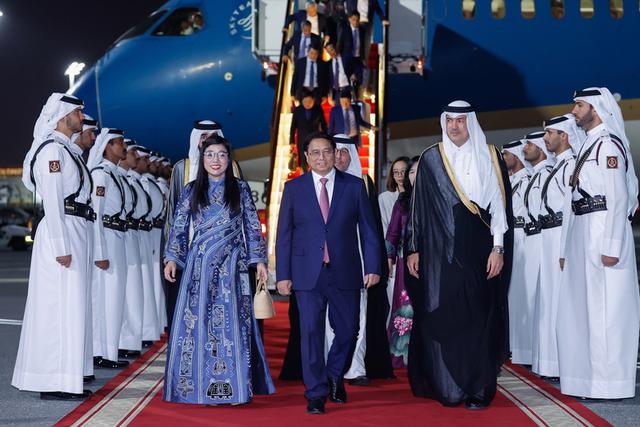Prime Minister Pham Minh Chinh, his spouse, and a high-ranking delegation of Vietnam arrived at Doha International Airport on October 30 evening (local time), beginning a three-day official visit to Qatar at the invitation of his Qatari counterpart Sheikh Mohammed bin Abdulrahman bin Jasim Al-Thani, according to a report from the Vietnam News Agency.
The Vietnamese leader and his entourage were greeted at the airport by Qatari Minister of State Ahmed bin Mohammed Al Sayed and Director of the Department of Protocol at the Qatari Ministry of Foreign Affairs Ibrahim Yousuf Abdullah Fakhro, along with Vietnamese Ambassador to Qatar Nguyen Huy Hiep, and representatives of the Vietnamese community in Qatar.
Qatar is the final stop on PM Chinh’s trip to three Middle East countries. This marks the first official visit by a Vietnamese Prime Minister to Qatar in 15 years and comes at a time when the bilateral relations are flourishing, yielding numerous tangible results. However, both sides have recognized that there remains significant potential to further enhance bilateral cooperation, particularly in promising areas such as politics-diplomacy, economy, energy, tourism, and labor.
The visit, therefore, aims to promote the relationship in a more comprehensive and effective fashion, particularly in market opening, high-quality investment attraction, and cooperation in labor, education, culture, sports, tourism, people-to-people exchange, and climate change response, as well as emerging fields like science -technology, clean energy, digital transformation, innovation, and the Halal industry.
Vietnam and Qatar officially established their diplomatic relations on February 8, 1993. Over the past 30 years, thanks to the efforts of high-ranking leaders and people of both countries, their multifaceted cooperation has seen significant developments in various fields.
Last year, two-way trade enjoyed a year-on-year surge of 32% to more than $497 million. Vietnam’s main imports included gas, plastics, and chemicals, while its key exports were aquatic products, electrical wires and cables, wooden products, and bamboo products.









 Google translate
Google translate